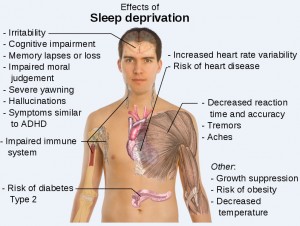-
How to Recognize Sleep Deprivation Symptoms
Thursday, December 11th, 2025by Dr. Gregory Brown
In today’s busy world, it is vital for people to understand what sleep deprivation symptoms are and what can be done about them. Until an individual understands the effects of sleep deprivation, they won’t be able to take the necessary steps to get their life back on track.
Symptoms of Sleep Deprivation
 Being constantly irritable is a telltale sign that a person is not getting sufficient rest. When someone is not well-rested, they may not feel prepared to deal with the responsibilities of daily life and will become quickly frustrated.
Being constantly irritable is a telltale sign that a person is not getting sufficient rest. When someone is not well-rested, they may not feel prepared to deal with the responsibilities of daily life and will become quickly frustrated.Chronic lack of sleep can be extremely detrimental to individuals in their personal or professional lives. In the case of business people, not getting enough sleep can literally make or break their success as they struggle with appointments, meetings and deadlines.
Sleep Deprivation and Depression
Constantly complaining about feeling fatigued is another sign that a person has been deprived of adequate rest. When someone doesn’t get enough sleep, it affects their entire outlook on life, and depression can result.
When a person does not wake up feeling refreshed and rejuvenated, that is a sure sign that they are not getting adequate sleep. If you want to be of help, try talking to the person about how much sleep they get each night and how rested they feel upon awakening in the morning.
Other Effects of Sleep Deprivation
Sleep-deprived individuals often struggle in social situations because their entire emotional outlook has been negatively affected. For example, they may lose their temper with a friend or coworker whom they would normally treat respectfully.
 People suffering from sleep deprivation may even seek to avoid social contact for extended periods of time. Shunning social activities that he or she normally enjoys is a sign that a person is having problems due to lack of sleep.
People suffering from sleep deprivation may even seek to avoid social contact for extended periods of time. Shunning social activities that he or she normally enjoys is a sign that a person is having problems due to lack of sleep.A person’s motor skills can also be affected by sleep deprivation. When an person is not sleeping well they will often move at a noticeably slower pace than they normally do.
For the person who is trying to deal with the responsibilities of daily living, sleep deprivation can be a huge detriment. Lack of sleep can also create dangerous situations in one’s daily life.
For example, a person who hasn’t slept well often has slower reflexes. If this individual decides to then drive a car, there is a much greater chance that an accident could result.
Lack of Sleep Leads to Poor Eating Habits
A person’s eating habits may also change significantly when they are not sleeping well. This is due to the fact that they lack sufficient energy to get through the day.
To make up for this, people often consume caffeine or sugar for a quick pick-me-up. The danger is that these poor eating habits become ingrained and hard to break, leading to a downward spiral of declining health.
Sleep deprivation symptoms are not hard to spot. In fact, most of the signs are obvious and noticeable to other people, whether they mention them or not.
It’s therefore important not to ignore the signs of lack of sleep. Instead, a person should accept the help and advice of others in order to cure sleep deprivation. Sleep aids like melatonin can also be of help.
Learn to Identify the Symptoms of Sleep Deprivation
In our 24-hour culture, many people find themselves cutting corners on their nightly allotment of sleep. While many of us view the loss of a few hours of sleep as nothing to worry about, over a period of several days these lost hours continue to build up.
After several days of inadequate sleep, individuals may suffer from bouts of ill temper, muddled thoughts, and even mild delusions. These are just a few of the symptoms of sleep deprivation.
There are many other symptoms of sleep deprivation that can have an effect on the human body and brain. Sleep deprivation can create personal unhappiness, problems at work and even potentially life-threatening situations.
- If you’ve been experiencing stress lately, it may be due to lack of sleep. This is because sleep deprivation reduces a person’s normal capacity to deal with typical daily challenges and aggravations.
- Research has also shown that a good night’s sleep plays a key role in memory, as it facilitates connections between nerve cells. The less deep sleep a person gets, the fewer nerve cell connections that form. People do worse on memory tests when deprived of sleep.
- The brain metabolizes sugars at a slower rate when sleep deprived. It’s therefore no surprise that sleep-deprived individuals often crave sweets and salty foods. Research has also shown a clear connection between sleep deprivation and obesity. Sleep-deprived people have a higher risk of obesity when compared to people who get adequate sleep.
- Studies have also shown that sleep-deprived people are more likely to take risky decisions. Unable to see the long-term ramifications of their actions, they often make short-sighted and poor decisions that they later regret.
As you can see, it is important to understand and recognize the symptoms of sleep deprivation. Then proper steps can be taken to restore healthy and balanced sleeping habits for better mental and physical health.
(published January 3, 2011)


